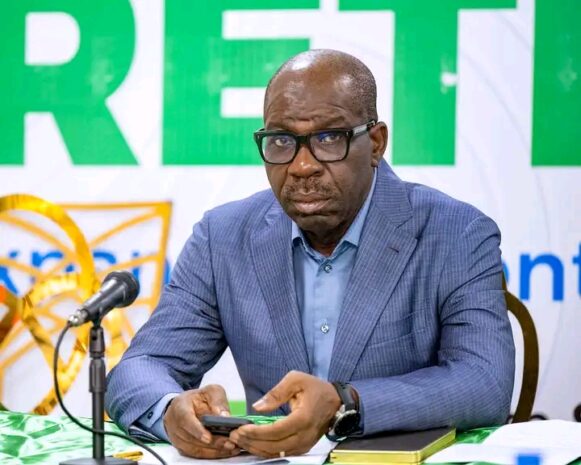•Declares State one of safest in Nigeria
Edo State Governor, Mr. Godwin Obaseki, has said the government was able to pay the new N70,000 minimum wage to its workers and fund the numerous developmental projects and other programmes initiated by his government to better the lives of the people from the savings from reducing the cost of governance.
A statement yesterday, quoted Obaseki to have said this in Benin City, adding that the State government made plans for the minimum wage three years ago when the telltale signs begun to show that the economy was going in the wrong direction.
According to him, “I am able to pay N70,000 because two or three years ago, I raised an alarm that we were resorting to massive borrowings, which will be inflationary in the long run. I predicted there will be massive devaluation of our currency.
“You will ask, if you knew this, what did you do? We knew it would translate into the demand for higher wages because of inflation and so we said, look, let’s focus on building a much more efficient economy. Let’s focus on reducing our cost of governance. Let’s focus on training our people and getting more productivity out of them.”
On efforts undertaken by his government to reduce cost of governance, Obaseki explained, “We have a Power Purchase Agreement (PPA) where we purchased 5-10 megawatts of power, which we use to run all of government offices and the street lights at night. So, I don’t have to buy diesel.
“I have a fleet management service, my own Uber, where I have put my own transport system, our cars, and vehicles into one transport system. So, I’m running the government at a fraction of what I used to run the system in the past.”
He further stated, “The savings I’m making from that, I’m saying, you know what, my most valuable assets are my people, let me pay them more and get more productivity out of them. I am measuring teachers today in terms of learning outcomes.
“My teachers can’t be absent from school because I can see all that from my tablet, whether a teacher is in class or not. I can relate my drug programme, what I pay for medicines to what’s been dispensed in my primary healthcare centers because I’ve trained my people. I have invested in technology. We have hugely invested in technology infrastructure.”
The governor added, “We have 2000 kilometers of fiber optic cable laid across the State. Every local government is connected with fibre optic technology.
“So, I’m able to extend telemedicine to a PHC in a community and get my doctors on the system. Why are we doing this? It’s to bring a better life to our people and how do you do it? We can’t make omelets without breaking eggs. So, once you decide that you want to make omelets, break the eggs. People will complain, but that’s the way it goes.”
Meanwhile, Obaseki, has said the government’s investment in strengthening the State’s security architecture and overhauling the security system led to the transformation of Edo as the safest in the South-south region and one of the most secure in the country.
Obaseki, said the government gained the confidence of investors, which according to him, resulted in the influx of businesses, leading to enhanced economic activities and increased revenues for the State.
The governor, while noting that security was local, listed some of the nuanced steps taken to include the decentralisation and democratisation of the security system to allow community participation in the State’s policing and security architecture.
He explained that the State has over 15,000 vigilante operatives policing various communities across the 18 local government areas in the State, adding that the initiative has tremendously improved safety and security in the State.
According to him, “On a scale, Edo is still the safest State in this zone. What we’ve done with security is to decentralise and democratise security. Security is local. Today, we have community participation in our policing.
“We have up to 15,000 men as vigilantes policing the various communities in the State. We trained them with the assistance of the Federal security agencies; we equipped them with communication devices and have invested in surveillance equipment.
“We have a lot of cameras in the streets; we have a Command and Control Center where all incidents get reported to and there’s response and dispatch, almost instantaneously.
“So, Edo is much safer today. Of course, you have incidents of bandits and one or two cases, but we respond. The major crime we have in Edo today is cultism. It leads to a lot of homicides and therefore when investors come in, insecurity is not a deterrent to most of them.”
He, however reassured that the government was taking measures to end the activities of cultists, Okaigheles, and other criminal gangs, in partnership with other security agencies in the State.
Obaseki added, “If you’re spending the night, just drive around town, you will see that people stay out late doing their business. So, we’ve managed security and it’s much better. It’s not affecting business as it did 6-7 years ago. The night economy in Edo, particularly in Benin, is thriving.”
























